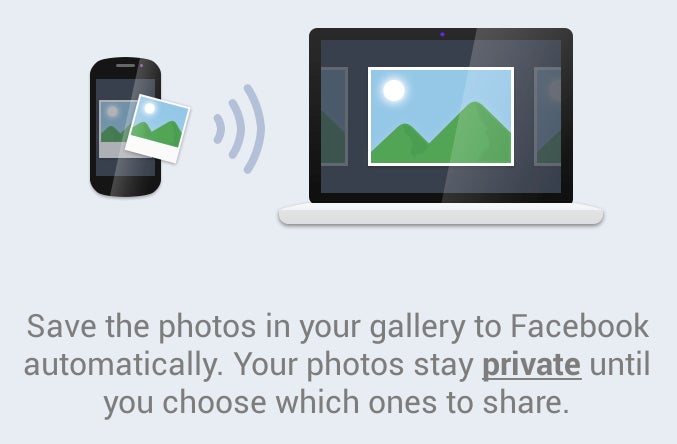Relax, Facebook’s Photo Sync is an opt-in feature. If you’re worried about privacy, simply don’t use it
Facebook won't be taking user's photos without permission.

Your support helps us to tell the story
From reproductive rights to climate change to Big Tech, The Independent is on the ground when the story is developing. Whether it's investigating the financials of Elon Musk's pro-Trump PAC or producing our latest documentary, 'The A Word', which shines a light on the American women fighting for reproductive rights, we know how important it is to parse out the facts from the messaging.
At such a critical moment in US history, we need reporters on the ground. Your donation allows us to keep sending journalists to speak to both sides of the story.
The Independent is trusted by Americans across the entire political spectrum. And unlike many other quality news outlets, we choose not to lock Americans out of our reporting and analysis with paywalls. We believe quality journalism should be available to everyone, paid for by those who can afford it.
Your support makes all the difference.OH MY GOD! Facebook wants to mine our photos for data! How will we ever defend ourselves from this free-to-use, private-by-default, opt-in service?! Calm down people, it’s just Facebook catching up with the competition again.
With every month that passes, another Facebook privacy scandal is born. This time it’s centred around the new Photo Sync feature Facebook have baked into their Android and iOS apps, making it possible to auto upload all the photos you take directly into a private photo album within your Facebook gallery.
This sort of feature is nothing new. Google+ has supported instant photo uploading since its inception over 16 months ago. Dropbox, the popular cloud storage service, has also been providing photo upload functionality in its mobile apps since April of this year. In both cases the features have been well received and are used regularly by many users.
On the whole, I expect a majority of Facebook users will ignore the new feature and go about their daily social media routine as normal. I’ve already seen a dozen people do this, as the update presented itself at the top of their news feeds. In each case, the person acknowledged the new feature, tapped ‘cancel’, and went about their business as before.
Some users on the other hand, will embrace the new feature and allow Facebook to collect their photos and store them in a private folder, ready to be shared at a later date or discarded over time. Serial sharers, social media addicts and photographers will likely embrace the new features with open arms. Just as they did on Google plus well over a year ago.
Then there are the conspiracy theorists, who will naturally be outraged by the idea, and insist that “Facebook just want to mine your uploaded photos for data!”, “Facebook will know who your location and determine who you’re hanging out with by scanning the faces of the people in your photos!”, “Facebook will use brands it identifies in photos to target ads at you!”
Ladies, gentlemen, and conspiracy theorists, please pay attention to this next bit. Facebook already knows all of this information. Their apps see your location whenever you interact with them. You add the people you know to your friends lists on a regular basis. You already proactively ‘like’ your favourite brands and services.
If you are genuinely worried about how Facebook will use the photos that you upload, then spend the time to actually read the terms of service and privacy policies that are in place to explain this in mind-numbing detail. If Facebook are doing anything untoward with your data, then they must, by law, disclose this in the policies they provide.
With half of the Internet already potentially using their services, privacy snafus are something Facebook endeavours to avoid at all cost. Especially after their previous miss-steps concerning user data.
If you don’t want all of you photos to be uploaded automatically, then don’t use the feature. It is an opt-in service. If you have already opted in, then go into your settings and simply opt-out. It’s as simple as that. Manage your photo uploads manually, Facebook is already receiving the same signals from you based on dozens of different features you already use.
If you want your online social activity to be as private as possible, simply stop using free, ad-supported social networks altogether. It’s either that, or we all start paying to use social networks, and have our governments enforce privacy audits. No, I didn’t think you’d fancy doing that. Free and ad-supported doesn’t sound so bad when you put it that way, does it?
Join our commenting forum
Join thought-provoking conversations, follow other Independent readers and see their replies
Comments